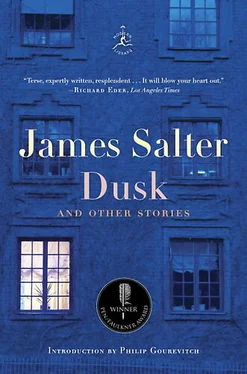James Salter
DUSK AND OTHER STORIES
INTRODUCTION
by Philip Gourevitch
As a young man, he flew. He had always wanted to be a fighter pilot; then, during training, he crashed into a house, and he flew transport for six years until he became a fighter pilot after all. He flew an F-86 mostly. He wasn’t one of the greats, he once said, he wasn’t an ace, but he was “in the show.” He was twenty, in 1945, when he graduated from West Point and took his commission in the United States Army Air Force. That date might make you think he missed the war, but there is always another war, and his was Korea. He flew a hundred combat missions. You can read about it in The Hunters , his first novel: the barracks life, the waiting for action, then taking off, hunting the sky over the Yalu River for Soviet MIGs, the dogfights, the hunger for a kill, coming back to base on the last drop of gas—or not coming back. The book was published in 1957, and with that, after twelve years as a pilot, he resigned from the Air Force to be a writer.
The pilot was called, as he had been from birth, James Horowitz. The writer called himself James Salter. He was handsome, and he had style. He lived in Europe. His prose announced itself with a high modernist elegance. He made language spare and lush all at once—strong feelings made stronger by abbreviation, intense physicality haunted by a whiff of metaphysics: for everything that is described, even more is evoked.
In the sixties and into the seventies, he wrote screenplays. For Sidney Lumet he wrote The Appointment , and he saw his script made flesh by Omar Sharif, Anouk Aimée, and Lotte Lenya. For Robert Redford, he wrote Downhill Racer . He wrote two more movies that were made, and a dozen that were not, before the waste of spirit on work that never saw light took its toll and he gave it up. At the same time, he had written his most original and enduring novels, A Sport and a Pastime and Light Years , as well as the masterly stories in this collection, Dusk . These books all have the flickering hyper-vividness of cinema, the atmospherics, the jump-cut acuity, and that swift, skimming telegraphic emotion that gives a sense of immense depth to surfaces. Of course Salter achieves his effects without using anything more than any other writer—just words on paper—and so he makes other writers take notice and wonder how he does it.
To say that Salter is a writer’s writer, then, is to say that he is still flying, and that, in fact, he will fly forever; and it is also to say that he writes magnificent sentences. In his memoir, Burning the Days , he describes the romance and the drill of his life as a pilot—dropping out of the sky into new places, each lit in its own way by prospects of camaraderie (the company of men), seduction (the company of women), the good drinks, the fresh beds, and the strange dawns that come before lifting off, once more, into the sky. There is a kind of ecstatic melancholy to that life of flight and routine—flight as routine. From the ever-predictable strictures and structures of the military, he took wing into boundlessness.
The problem, Salter has said, was that the flying life was lived entirely in the present, and he chose the writing life instead because he wanted to make something continuous and permanent out of “this rubble of days.”
“Because all this is going to vanish,” Salter told the poet Edward Hirsch in a 1993 interview for The Paris Review , the magazine where Salter had published his first stories. “The only thing left will be the prose and poems, the books, what is written down. Man was very fortunate to have invented the book. Without it the past would completely vanish, and we would be left with nothing, we would be naked on earth.”
One feels this reading him: that Salter is always bearing down on his own prose to make it yield his observations and perceptions with special precision. In his interview, he said that a short story must be compelling, it must be memorable, and it must be “somehow complete.” By way of example, Salter cited Isaac Babel, one of his heroes. He said: “He has the three essentials of greatness: style, structure, and authority.” These are the qualities of Salter’s work too; and for all the interiority, for all that is inventive and fanciful in these stories, they are drawn from deep in the well of life.
“The notion that anything can be invented wholly and these invented things are classified as fiction and that other writing, presumably not made up, is called nonfiction strikes me as a very arbitrary separation of things,” Salter told Ed Hirsch. “We know that most great novels and stories come not from things that are entirely invented, but from perfect knowledge and close observation. To say they are made up is an injustice in describing them. I sometimes say that I don’t make up anything—obviously, that’s not true. But I am usually uninterested in writers who say that everything comes out of the imagination. I would rather be in a room with someone who is telling me the story of his life, which may be exaggerated and even have lies in it, but I want to hear the true story, essentially.”
The truth for Salter may reside in an erotic realm, or in a serious confrontation with disappointment and mortality, or it can come in bursts of humor and exuberance. I first read the stories in Dusk twenty years ago, not long after the book came out, and I have never forgotten, nor have I ever failed to laugh at the memory of, the lines at the beginning of the story, “American Express,” where he writes: “Frank’s father went there [the Four Seasons] three or four times a week, or else to the Century Club or the Union where there were men even older than he. Half of the members can’t urinate, he used to say, and the other half can’t stop.”
One of the greatest pleasures of reading Salter is that he seems prepared to allow himself anything. Look at how he uses what most writers would consider introductory, expository information about a character as the ending of the story “Am Strande von Tanger”—a move that makes the most ordinary, given facts about a person appear suddenly crystallized as a fate. Or look at how, in the story “The Cinema,” he introduces a bit character, then interrupts the narrative flow to tell us all about her life at home, her parents’ marriage, her brother’s budding madness—and then, just as swiftly, returns to the thread of the story, barely mentioning her family again. In such ways, Salter continuously refreshes the short story form. His characters can even surprise themselves.
Most of the stories here are love stories, many are also stories of disappointment, and some describe the lives of writers. They were composed over many years and together they reflect Salter’s range of human concerns, of passions, of voices, of language. There is no need to choose a favorite, but I have one—and it almost feels as if it chose me the first time I read Dusk , and in every subsequent reading (Salter is one of those virtuosos to whom one keeps returning to be surprised afresh). The story that I always come back to is “Twenty Minutes” because it is stark and swift and in every instant physically immediate, and it manages at once to be suspenseful and wrenching and touchingly tender—and also because it is written, as if in real time, to tell the story of twenty minutes, no more or less, and in those twenty minutes it presents an entire life. This simultaneous compression and expansiveness is thrilling—both emotionally and as a matter of craft—and it reflects the height of Salter’s wisdom and his art.
“I believe there’s a right way to live and to die,” Salter said in his Paris Review interview.
Читать дальше












